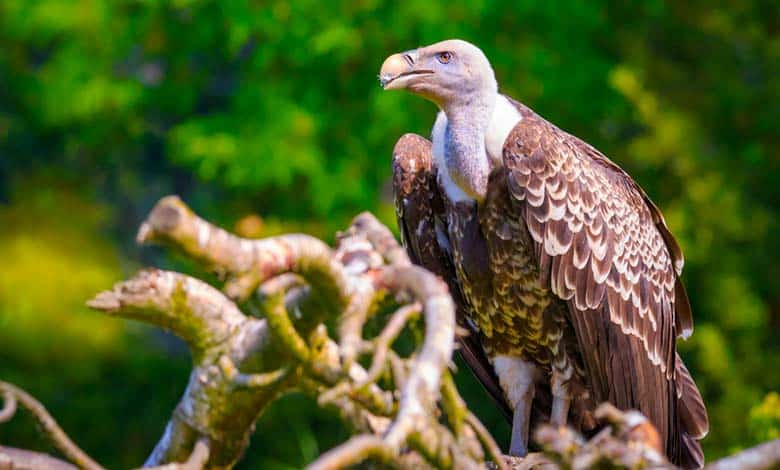
Vultures perform the most important role in the ecosystem. They are more important than all the other animals combined because they recycle 70% of all the nutrients of all the dead ungulates that die in the ecosystem. They’re responsible for disposing of them and recycling their nutrients. Also, they certainly helped to prevent the spread of diseases.
The toes and talons of vultures aren’t as agile and able as most other raptor species to kill prey. Vultures enter a particular niche as scavengers acting as the janitors of the bush. There is a clear interspecies hierarchy between them that considers the general size of the bull, the shape of their body size, and even social habits. The more gregarious Cape and white-back vultures are almost exclusively scavengers, dominating a carcass in sheer numbers.
Why do vultures not get sick?
Vultures have developed adaptations that allow them to consume and digest carrion (dead animal carcasses) without getting sick. Here are some reasons why vultures have remarkable disease resistance:
Highly Acidic Stomach: Vultures have an extremely acidic stomach with a low pH, typically between 0 and 2. This acidic environment kills off a wide range of bacteria and other pathogens that may be present in decaying flesh. It helps sterilize their digestive system, reducing the risk of infection from ingested pathogens.
Strong Immune System: Vultures possess a robust immune system that allows them to handle the potential pathogens present in carrion. They have a high concentration of antibodies in their blood, which helps neutralize harmful microorganisms. Additionally, their immune system shows adaptations to deal with toxins produced by decomposing tissues.
Efficient Digestive System: Vultures have a unique digestive system that allows them to process carrion safely. Their digestive tracts are short, reducing the time for bacterial colonization and minimizing the chances of pathogens spreading. Furthermore, their digestive enzymes are highly potent and can break down harmful bacteria and viruses.
Antibacterial Properties of Their Diet: The diet of vultures, consisting primarily of carrion, exposes them to various potentially harmful microorganisms. However, the very nature of carrion is self-selective for vultures. Carrion contains toxins, bacteria, and other pathogens that harm most organisms but not vultures. The carrion’s antimicrobial properties and the vultures’ adaptations help protect them from infection.
Behavioral Adaptations: Vultures exhibit specific behaviors that minimize their exposure to pathogens. For example, they have a unique habit of bathing and cleaning themselves, often by sunbathing or immersing themselves in water. This behavior helps sanitize their feathers and remove potential pathogens that may be present in their bodies.
The world’s 23 species of vultures have evolved the ultimate friggin palate. They pretty much eat exclusively dead things with the help of their amazing digestive systems. The stomach breaks down food using gastric juices comprised mainly of hydrochloric acid to dissolve bonds, protein molecules, and digestive enzymes. That continues the dismantling process. The average levels of a normal human gastric system are between 1 and 2 on the pH scale.
- The stomach acids of some vultures come in between zero and one, so corrosive that they can dissolve certain metals.
It is super cool, but unless they’re trying to eat a robotic raccoon not particularly useful. That’s why the bird’s super strong acid cocktail always kills many pathogens that would be lethal to lesser scavengers, from Salmonella and cholera to anthrax botulism, even rabies. In addition to laying the smackdown on nasty bugs in the digestive tract and pumping blood thick with bacteria-fighting antibodies.
Vultures have a few more tricks up their feathered sleeves to stay healthy. They do poop directly on their legs which is strangely brilliant. This evaporating waste slurry is a great way to cool down on a hot day. The whitish slop contains some great acid, a great sanitizer on the legs. That has been needed in rot.
Also, the waste keeps killing pathogens in the grass around the carry and helping to prevent the spread of disease to other animals, even to soil and water systems. So vultures are like a hazmat cleanup crew. Their bald head also keeps it clean since they’ve got to get all up and mushy chest cavities and guts.
Why do vultures vomit? Vulture’s projectile vomits to protect themselves from predators, but this is only half true. They do indeed produce an impressive hurl storm. But it probably isn’t to spew rabies and coyotes’ faces. However, vulture vomit may burn those unlucky enough to get splattered. It’s perhaps more to do with the fact that they’ve gorged so much on meat that they’re too heavy to lift off quickly. Thus they need to lighten the load. At that point, any potential predator would presumably think hot acid vomit and leave the bird alone!
Solitary or sometimes slightly gregarious species are scavengers, but they will hunt and kill small prey sources when the opportunity presents itself. Species are like the hooded vulture. For example, it will even feed on invertebrates. Lappet-faced vultures will all kill a wide range of small prey. The latter two species even sometimes are capable of killing baby antelope.
Lappet-faced vultures have even been recorded to hunt flamingo fledglings cooperatively. So vultures hunt not all of them, but some can do so. When the opportunity presents itself, they’re going to grab it.
Read More:
How Do Enzymes Lower Activation Energy Work?
References:
Chuang Zhou, Guannan Wang, Genome-wide analysis reveals the genomic features of the turkey vulture (Cathartes aura) as a scavenger.
